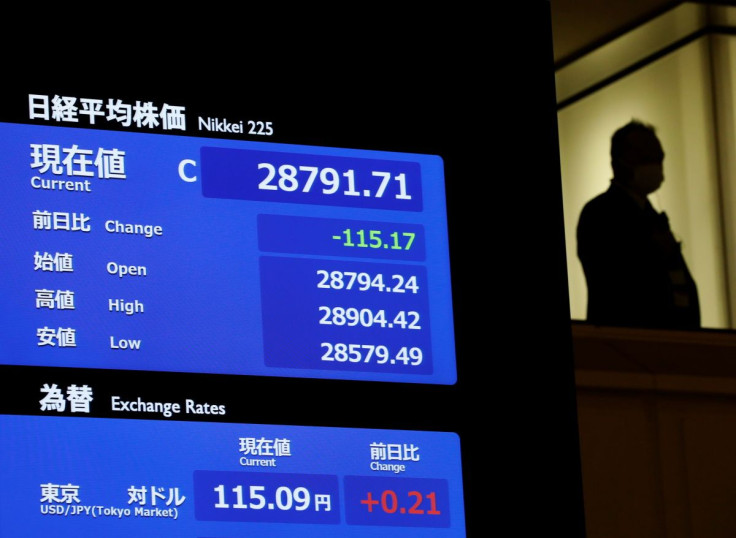Stocks Rebound, Oil Slips As Russia-Ukraine Tensions Ease

Stocks on Wall Street and in Europe rebounded on Tuesday while oil prices fell, after Russia indicated it was withdrawing some troops from exercises near Ukraine and President Vladimir Putin said he saw room for further discussion with the West.
Gold and bond prices also slid as safe-haven assets lost some of their appeal with tensions easing over Ukraine. But NATO said it had yet to see any evidence of de-escalation and a vote in Russia's lower house threatened a wider standoff.
The State Duma agreed to ask Putin to recognize two Russian-backed breakaway regions in eastern Ukraine as independent, a move the European Union told Moscow not to adopt.
The dollar index pared losses as Putin and German Chancellor Olaf Scholz spoke, a sign tensions over Ukraine haven't been resolved. But the index later fell 0.286%, suggesting there was little flight to safety, especially as the euro, which had weakened recently, rose 0.45% to $1.1356.
"In the back of everybody's minds this is not going away. Putin might be saying one thing and just waiting for the right time to make a move," said Tom di Galoma, managing director at Seaport Global Holdings.
Major stock indices rose on both sides of the Atlantic, with megacap growth and banks leading the rally on Wall Street and the major European bourses posting gains of more than 1%.
The pan-European STOXX 600 index closed up 1.43% after falling three consecutive sessions, while MSCI's U.S.-centric gauge of global equities rose 1.20%.
On Wall Street, the Dow Jones Industrial Average rose 1.06%, the S&P 500 added 1.35% and the Nasdaq Composite advanced 2.12%.
The Russian ruble strengthened 1.59% versus the greenback at 75.51 per dollar.
While the Ukraine crisis simmered, an increase in U.S. producer prices by the most in eight months in January, according to the Labor Department, was a reminder that high inflation could persist through much of this year.
The Federal Reserve is aware inflation is running hot but knows rising home prices and mortgage rates will soon crimp the pocket book of many Americans, leading the economy and inflation to slow, said Peter Cramer, senior managing director at SLC Management.
"They know they have to get inflation under control, but the slowing of economic activity that will really help do that is already starting to happen," he said.
A closely watched part of the yield curve measuring the gap between yields on two- and 10-year Treasury notes, seen as an indicator of economic expectations, is starting to signal a sharp slowdown, as it flattens to 47.2 basis points.
The odds of the Fed engineering a recession are increasing if policymakers do not push back against a market narrative of six or so interest rate hikes in a row, Cramer said.
It remains to be seen whether the Fed can get inflation under control by raising interest rates alone, di Galoma said.
Longer-dated U.S. Treasury and euro zone bond yields rose, as investors took comfort from the potential easing of tensions over Ukraine and essentially ignored the PPI data.
The benchmark 10-year Treasury note rose 4.9 basis points to 2.045%. Germany's 10-year yield touched its highest since 2018 on the day's easing of Russia-Ukraine tensions.
Investors also focused on the trajectories for major central banks to tighten monetary policy. Fed officials are split over how aggressively to raise rates.
Markets are pricing in a 65.5% chance of a 50-basis-point hike and a 34.5% chance of a 25-bps hike at the U.S. central bank's March meeting.
"Energy prices are still trending upwards and that makes it more difficult for central banks to move less hawkish, so we still think risk assets are under pressure going forward and yields should be going higher," said Peter McCallum, rates strategist at Mizuho.
Oil prices tumbled more than 3% as they retreated from a seven-year high.
U.S. crude futures fell $3.39 to settle at $92.07 a barrel, while Brent futures settled down $3.20 at $93.28 a barrel.
Precious metals also fell, with gold slipping from a multi-month high and palladium shedding more than 5%.
U.S. gold futures settled down 0.7% at $1,856.20 an ounce.
Bitcoin was up 4.19% to $44,010.69.
© Copyright Thomson Reuters 2024. All rights reserved.





















